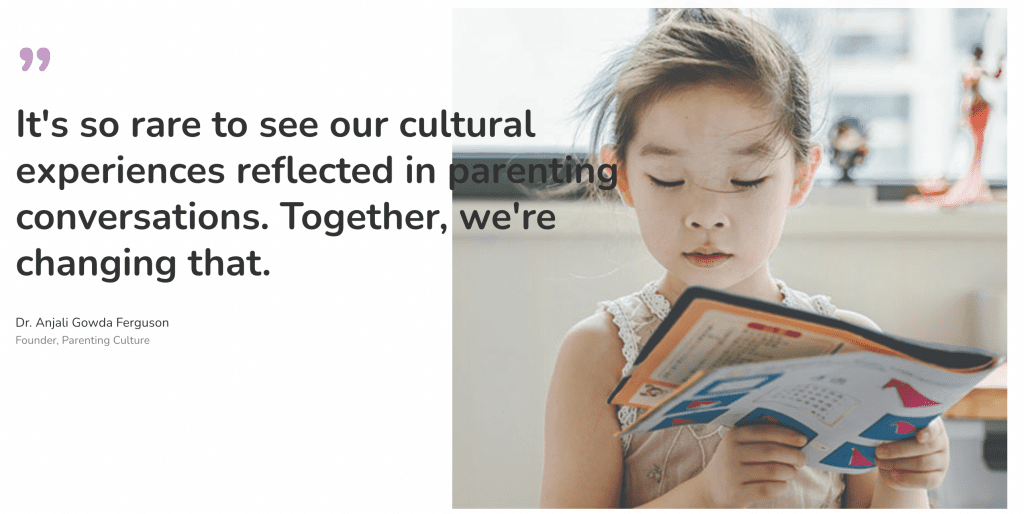Dr. Anjali Ferguson is a clinical psychologist with expertise in early childhood mental health, trauma-informed, culturally responsive care. Dr. Ferguson is a cis-gender, second-generation South Asian female in an interracial and multi-faith relationship and the mother of a Blindian (Black X Indian child). Much of her current professional work is heavily informed by her personal lived experiences.
Dr. Ferguson became interested in parenting and human behavior at a young age. Growing up in the United States as a minoritized child, she was often struck by the differences in her experiences relative to her nonimmigrant peers. This interest was later peaked when her family moved back to India for a few years and she was confronted with childhood experiences much different from those in the United States. Here, Dr. Ferguson’s commitment to child rights was ignited. She began her psychological career in college through participation in research labs focused on childhood trauma. She then accepted a position in a graduate program to further her research and clinical interests.
We spoke to Dr. Anjali Ferguson on The International Day for the Elimination of Racial Discrimination, about Culturally Responsive Parenting and racial trauma in children.
It’s Women’s Month! What does Women’s Month mean to you?
Women’s month to me is just a reminder to celebrate all of the amazing women in my life and those that came before me. A celebration of not just the public forces who broke glass ceilings, but also of the less-celebrated, assertive, innovative, loud, silent, nontraditional, advocates and cycle-breakers who are changing lives and communities through their work and existence. The month is a reminder to empower fellow women and continue to show up for each other. Remembering that when one of us wins, we all win-so we should ensure to build as we climb.
March 21st is The International Day for the Elimination of Racial Discrimination. The struggle against racial discrimination is an ongoing one, to build peace in the minds of men and women, through education for tolerance and the rejection of racist stereotypes that may persist in culture or in the media. You work with treating racial trauma and its mental health effects on children and families. What does racial trauma look like, and what are the impacts of systemic racism/racial trauma?
Racial trauma and experiences with racism often look like a stress response. You may see increases in anxiety, depression, poor sleep, avoidance of certain environments, poor appetite, impacts on work and school. When collective stressors become increasingly prevalent like the increase in exposure to police brutality following George Floyd’s murder, you may also see heightened crisis responses like greater suicidal ideation. Over time, systemic racism and racial trauma can have significant impacts on health and mental health outcomes. For some minoritized groups, experiences with systemic racism in a daily battle that impacts economic freedom, access to quality care, educational experiences, good nutrition, social supports. Data indicates that these greater burdens of social determinants of health can have lasting medical symptomatology like greater risk for cancer, diabetes, heart disease, substance abuse, and obesity.

How do we, as parents address racial trauma in children, and how do we foster a safe environment that encourages communication and understanding?
One of the first steps is recognizing that racial trauma can impact our children. They may not experience the stressor in the same way as adults, but they are capable of having a stress response in the face of racism and collective trauma.
How do we foster a safe environment? Modeling coping. Children are very adept to changes in their caregivers. So, chances are they notice when we are under stress or impacted by something. This is a great opportunity to model healthy coping for our children. It is alright to let them know that these experiences are stressful to you (name it), and then show them ways you decompress when you face these stressors.
Be honest about the experience. Contrary to some individual beliefs, children are capable and able to discuss race-related issues early in development. In fact, when they notice race-related differences they often want language to help understand these processes. Do not shy away from these conversations or minimize the truth. Be honest about history and meet your child at their developmental level with these discussions.
Keep communication channels open. Chances are these types of discussions will come up several times throughout a child’s development. Let them know you are a safe place to ask questions and express emotions. Welcome discussion and avoid judgment during these conversations. For example, if a child expresses strong anger about an experience, welcome and allow the anger and discuss why they may have felt angry; then offer some positive ways to channel their frustrations. Avoid telling them not to feel angry, hurt, scared, etc. All feelings are welcome, but what we do with those feelings is important.
Racial socialization. All individuals gain empathy and build their own pride/identity through exposure to individuals from their communities and from those of different communities. Make sure you are continually engaging in socialization with groups who may not be from the same communities as you. This helps children embrace differences and appreciate the individual and cultural nuances.
Promote Joy. While this may seem trivial, one of the strongest ways to combat racial trauma is to build cultural joy. This may look different for everyone, but ensure that you are intentionally creating moments of joy throughout the day. Even a small activity of helping your child think of one moment of happiness in the day can be very grounding. Also help your child create memories and joy around your culture/traditions (with games, movies, books, artwork, play, parties, etc.) Help them share these moments of joy with others to build positive cultural identity.
What is Culturally Responsive Parenting? Why is it important in today’s day and age?
Culturally responsive parenting refers to the notion that there is no “one size fits all” parenting. And that our current eurocentric models of parenting may not apply to all families. To be culturally-responsive is to consider the intersectionality of families and be family-centered when it comes to supporting a family unit’s specific goals, identities, and path for support of their children. This approach also understands that one family’s path may very well be different from the next and is likely to be impacted by all of the intersectional identities at play. Therefore, within the context of parenting we must also consider how experiences with culture, race, gender, immigration, generation status, education, etc. impact how someone parents.
Please tell us about Parenting Culture.org. What was your ‘Why’ in starting Parenting Culture?
Parenting culture is an inclusive parenting community and resource that seeks to address the gaps in existing parenting conversations by providing culturally responsive strategies.
My why- my son. Being the mother of a biracial black child, I felt a sense of responsibility to ensure he was being supported holistically. As a non-black minoritized individual, I know the responsibility of allyship is mine to carry to ensure equity even within a parenting discussion. I want to be sure that all families are having discussions about race (gender, culture, etc.) and how to support our historically marginalized families together. Therefore, I wanted to offer resources to spark conversation and to help families navigate these inevitable difficult discussions. We cannot fully avoid these conversations with our children, they only become postponed. So, we want to be a resource to parents and help them see more of their experiences as a family represented, while also providing tools for the tough moments.
Learn more about Dr. Anjali Ferguson and the amazing work she does at www.draferguson.com
Learn more about Parenting Culture at www.parentingculture.org . There you’ll find resources like Strategies for Racial Socialization, sign up for their newsletters, and book Dr. Ferguson for your next conference or training.
Follow Dr. Ferguson on Instagram.
Watch Gloria’s interview with Dr. Ferguson, here.




